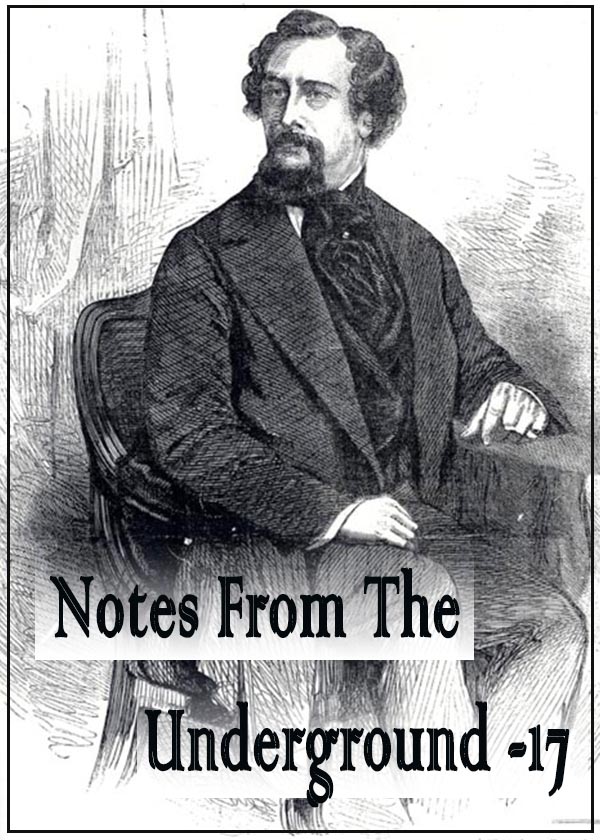Notes From The Underground -17
Notes From The Underground -17


Yes, but here I come to a stop! Gentlemen, you must ex-cuse me for being over-philosophical; it’s the result of forty years underground! Allow me to indulge my fancy. You see, gentlemen, reason is an excellent thing, there’s no disputing that, but reason is nothing but reason and satisfies only the rational side of man’s nature, while will is a manifestation of the whole life, that is, of the whole human life including reason and all the impulses. And although our life, in this manifestation of it, is often worthless, yet it is life and not simply extracting square roots. Here I, for instance, quite naturally want to live, in order to satisfy all my capacities for life, and not simply my capacity for reasoning, that is, not simply one twentieth of my capacity for life. What does reason know? Reason only knows what it has succeeded in learning (some things, perhaps, it will never learn; this is a poor comfort, but why not say so frankly?) and human nature acts as a whole, with everything that is in it, con-sciously or unconsciously, and, even if it goes wrong, it lives.
I suspect, gentlemen, that you are looking at me with com-passion; you tell me again that an enlightened and developed man, such, in short, as the future man will be, cannot con-sciously desire anything disadvantageous to himself, that that can be proved mathematically. I thoroughly agree, it can—by mathematics. But I repeat for the hundredth time, there is one case, one only, when man may consciously, pur-posely, desire what is injurious to himself, what is stupid, very stupid—simply in order to have the right to desire for himself even what is very stupid and not to be bound by an obligation to desire only what is sensible. Of course, this very stupid thing, this caprice of ours, may be in reality, gentlemen, more advantageous for us than anything else on earth, especially in certain cases. And in particular it may be more advantageous than any advantage even when it does us obvious harm, and contradicts the soundest con-clusions of our reason concerning our advantage—for in any circumstances it preserves for us what is most precious and most important—that is, our personality, our individuality. Some, you see, maintain that this really is the most precious thing for mankind; choice can, of course, if it chooses, be in agreement with reason; and especially if this be not abused but kept within bounds. It is profitable and sometimes even praiseworthy. But very often, and even most often, choice is utterly and stubbornly opposed to reason ... and ... and
... do you know that that, too, is profitable, sometimes even praiseworthy? Gentlemen, let us suppose that man is not stupid. (Indeed one cannot refuse to suppose that, if only from the one consideration, that, if man is stupid, then who is wise?) But if he is not stupid, he is monstrously ungrate-ful! Phenomenally ungrateful. In fact, I believe that the best definition of man is the ungrateful biped. But that is not all, that is not his worst defect; his worst defect is his perpetual moral obliquity, perpetual—from the days of the Flood to the Schleswig-Holstein period. Moral obliquity and conse-quently lack of good sense; for it has long been accepted that lack of good sense is due to no other cause than moral obliq-uity.
Put it to the test and cast your eyes upon the history of himself even what is very stupid and not to be bound by an obligation to desire only what is sensible. Of course, this very stupid thing, this caprice of ours, may be in reality, gentlemen, more advantageous for us than anything else on earth, especially in certain cases. And in particular it may be more advantageous than any advantage even when it does us obvious harm, and contradicts the soundest con-clusions of our reason concerning our advantage—for in any circumstances it preserves for us what is most precious and most important—that is, our personality, our individuality. Some, you see, maintain that this really is the most precious thing for mankind; choice can, of course, if it chooses, be in agreement with reason; and especially if this be not abused but kept within bounds. It is profitable and sometimes even praiseworthy. But very often, and even most often, choice is utterly and stubbornly opposed to reason ... and ... and
... do you know that that, too, is profitable, sometimes even praiseworthy? Gentlemen, let us suppose that man is not stupid. (Indeed one cannot refuse to suppose that, if only from the one consideration, that, if man is stupid, then who is wise?) But if he is not stupid, he is monstrously ungrate-ful! Phenomenally ungrateful. In fact, I believe that the best definition of man is the ungrateful biped. But that is not all, that is not his worst defect; his worst defect is his perpetual moral obliquity, perpetual—from the days of the Flood to the Schleswig-Holstein period. Moral obliquity and conse-quently lack of good sense; for it has long been accepted that lack of good sense is due to no other cause than moral obliq-uity. Put it to the test and cast your eyes upon the history of
































































